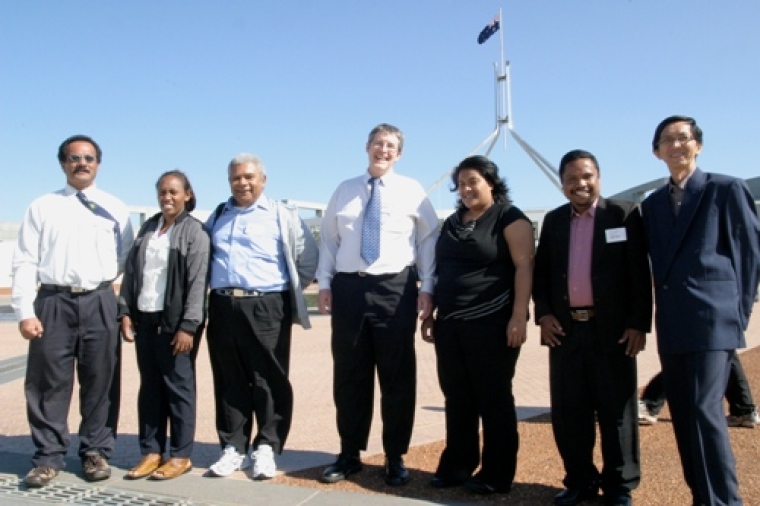
The Copenhagen negotiation, therefore, had important implications for poverty reduction and for the work of the Millennium Development Goals (MDGs), which aim to halve global poverty by 2015.
In the midst of global commentary on Copenhagen and the ongoing debate about an Emissions Trading Scheme in Australia, Micah Challenge is calling people not to forget the world's poor.
"In many parts of the world, climate change threatens progress toward the MDGs. Already there are an estimated 150 000 extra deaths each year because of climate change, most of them children. Far from making poverty history, climate change threatens to make poverty permanent", said National Coordinator of Micah Challenge Australia, Mr. John Beckett.
Earlier this year, Micah Challenge supporters were joined at Voices for Justice 09 by a delegation of community leaders from Asia Pacific who came to lobby our politicians on the issue of 'climate justice'.
The delegation included Rev. Tafue Lusama (Tuvalu), Jose Guterres (Timor Leste) Oiner Leutu (Solomon Islands), Bridget Sitai (Vanuatu), John Lui (Vanuatu) and Iskanda Saher (Indonesia). These are the names of real people, from real communities. These are our brothers and sisters in Christ – our neighbours who now, more than ever, need Australia to have the courage to act as a Samaritan Nation.
"Climate change has become a matter of life and death for us, and we need to make sure the whole world, developed and developing, acts to solve the problem", Rev. Lusama said.
After hearing from these inspiring people about the devastating impact of climate change in their countries, Micah Challenge felt called to take stronger action to ensure climate justice for the poor.
There is widespread disappointment at the deal brokered by world leaders at Copenhagen. While the commitment by a vast majority of leaders to keep warming below 2 degrees centigrade is encouraging, the current Copenhagen deal, with the absence of concrete targets, cannot guarantee a limit on warming. That spells disastrous effects for the world's poor.
Similarly, the recognition that the heavy polluting developed nations need to provide financial support for developing countries to adapt is a step in the right direction. However, the US $30 billion promised over the next three years will fall well short of what is needed.
The Copenhagen deal does open up the possibility for up to US$100 billion globally per year to be allocated to climate financing for developing nations by 2020.
"This $100 billion figure gives us something to work towards. However, in the absence of any binding agreements on nations, we must build pressure on governments around the world to hold to these commitments", said Mr. Beckett.
Importantly, it is still unclear where Australia's contribution to this funding will come from. Micah Challenge notes that climate change has emerged as a new problem, long after wealthy countries promised to provide 0.7% of Gross National Income (GNI) to impoverished countries to provide for development needs. The Australian government must ensure that any funding allocated for climate change adaptation is additional to existing contributions to overseas development, and beyond the 0.7% GNI promise, which Australia is yet to reach.
Micah Challenge is calling on Christians in Australia to continue to advocate for people in poverty who are experiencing the effects of a changing climate.
"It is vitally important, as disciples of Jesus, that we continue to join our voices with the voices of the world's poor to speak up for justice in the ongoing climate change negotiations", said Mr. Beckett.
For more information on the Micah Challenge Climate Justice campaign, visit www.micahchallenge.org.au/climate-justice.